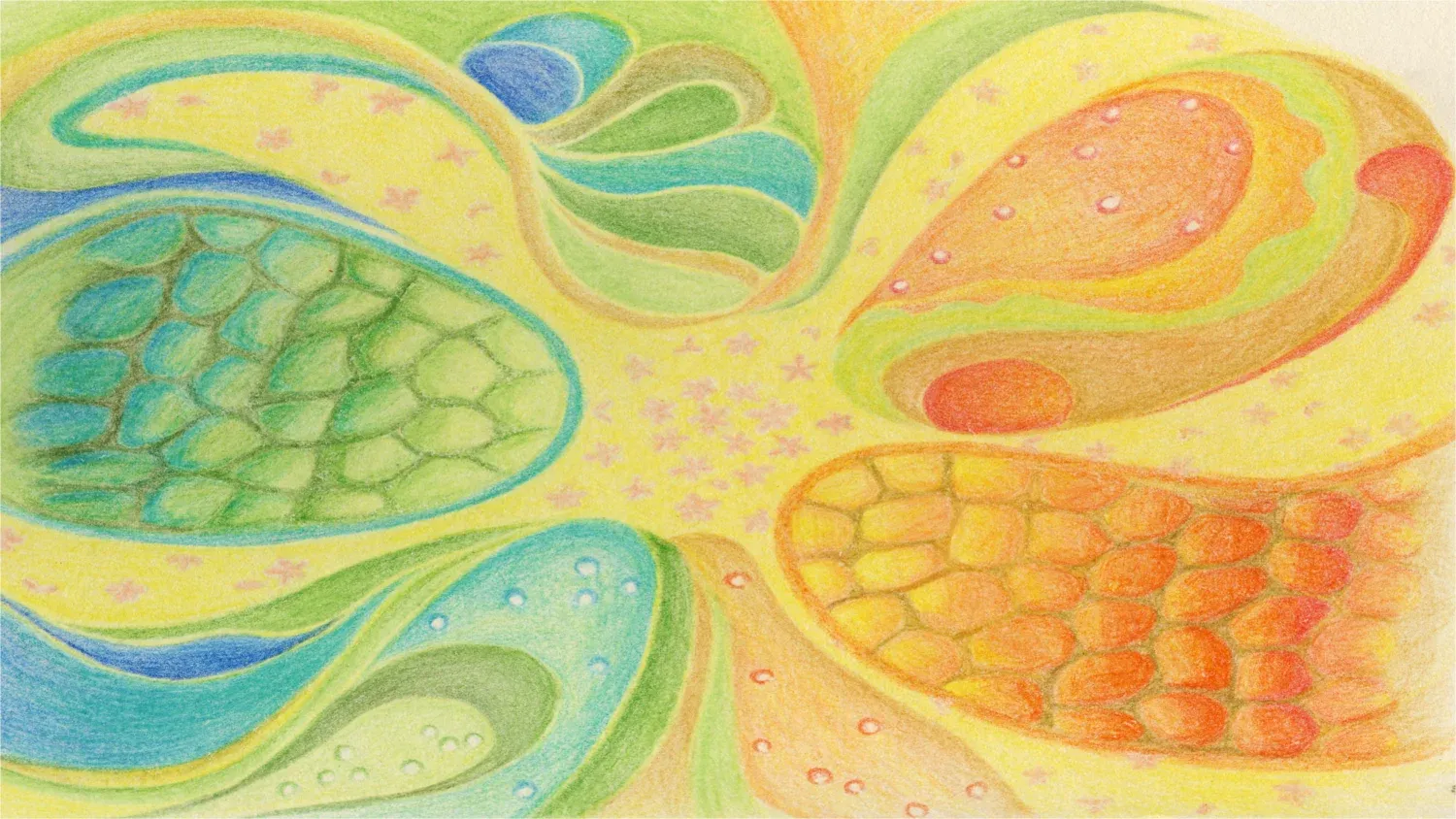Our research
We study how human skin repairs itself after injury — and why this process sometimes fails. Wound healing is a fundamental biological program, yet chronic wounds remain a major medical challenge, affecting millions of patients worldwide and lacking effective treatments. Our lab seeks to decode the molecular logic of skin repair, uncover why healing goes awry in chronic wounds and after cancer radiotherapy, and translate these insights into new therapeutic strategies.
Our research spans four interconnected themes:
1. Molecular atlas of human wound healing
We are building the first comprehensive, spatiotemporal molecular map of human skin repair. Through multimodal single-cell and spatial transcriptomics of acute and chronic wounds, we chart how diverse cell types coordinate across the phases of healing — and why this process sometimes fails in chronic conditions such as pressure ulcers. In parallel, we have performed bulk RNA sequencing to profile long non-coding RNA, microRNA, and circular RNA expression in human acute and chronic wound samples. Together, these datasets provide a multi-layered view of gene regulation in wound biology. Our interactive wound atlas (link) makes these data publicly accessible as a community resource, enabling broad exploration of human wound biology.
Related publications:
Spatiotemporal single-cell roadmap of human skin wound healing.
Liu Z, Bian X, Luo L, Björklund ÅK, Li L, Zhang L, Chen Y, Guo L, Gao J, Cao C, Wang J, He W, Xiao Y, Zhu L, Annusver K, Gopee NH, Basurto-Lozada D, Horsfall D, Bennett CL, Kasper M, Haniffa M, Sommar P, Li D, Landén NX
Cell Stem Cell 2025 Mar;32(3):479-498.e8
Integrative small and long RNA omics analysis of human healing and nonhealing wounds discovers cooperating microRNAs as therapeutic targets.
Liu Z, Zhang L, Toma MA, Li D, Bian X, Pastar I, Tomic-Canic M, Sommar P, Xu Landén N
Elife 2022 Aug;11():
Circular RNA Signatures of Human Healing and Nonhealing Wounds.
Toma MA, Liu Z, Wang Q, Zhang L, Li D, Sommar P, Landén NX
J Invest Dermatol 2022 Oct;142(10):2793-2804.e26
Single-Cell Analysis Reveals Major Histocompatibility Complex II‒Expressing Keratinocytes in Pressure Ulcers with Worse Healing Outcomes.
Li D, Cheng S, Pei Y, Sommar P, Kärner J, Herter EK, Toma MA, Zhang L, Pham K, Cheung YT, Liu Z, Chen X, Eidsmo L, Deng Q, Xu Landén N
J Invest Dermatol 2022 Mar;142(3 Pt A):705-716
2. Regulatory RNAs in skin repair
We focus on non-coding RNAs (ncRNAs) — including microRNAs, long non-coding RNAs, and circular RNAs — as key regulators of wound healing. These molecules are highly cell-type specific and evolve rapidly, making them promising therapeutic targets. Using patient-derived wound tissues, advanced single-cell and spatial transcriptomics, and functional models, we map how ncRNAs control the cellular choreography of repair. Our work has identified multiple ncRNAs with central roles in tissue regeneration, and we have demonstrated their therapeutic potential in preclinical wound models.
Related publications:
Collaborative Duality of CircGLIS3(2) RNA and Protein in human Wound Repair.
Niu G, Toma MA, Geara J, Bian X, Chen Y, Luo L, Wang Q, Xiao Y, Vij M, Piipponen M, Liu Z, Oasa S, Zhang L, Schlesinger D, Végvári Á, Li D, Wang A, Vukojević V, Elsässer SJ, Sommar P, Xu Landén N
Adv Sci (Weinh) 2025 Jul;12(25):e2416784
The lncRNA SNHG26 drives the inflammatory-to-proliferative state transition of keratinocyte progenitor cells during wound healing.
Li D, Liu Z, Zhang L, Bian X, Wu J, Li L, Chen Y, Luo L, Pan L, Kong L, Xiao Y, Wang J, Zhang X, Wang W, Toma M, Piipponen M, Sommar P, Xu Landén N
Nat Commun 2024 Oct;15(1):8637
Circular RNA circASH1L(4,5) protects microRNA-129-5p from target-directed microRNA degradation in human skin wound healing.
Wang Q, Niu G, Liu Z, Toma MA, Geara J, Bian X, Zhang L, Piipponen M, Li D, Wang A, Sommar P, Xu Landén N
Br J Dermatol 2025 Feb;192(3):468-480
Human skin specific long noncoding RNA HOXC13-AS regulates epidermal differentiation by interfering with Golgi-ER retrograde transport.
Zhang L, Piipponen M, Liu Z, Li D, Bian X, Niu G, Geara J, Toma MA, Sommar P, Xu Landén N
Cell Death Differ 2023 May;30(5):1334-1348
3. RNA-based regenerative therapies
Building on our mechanistic discoveries, we are developing therapeutic strategies that integrate molecular pharmacology, RNA biology, and regenerative medicine. Our goal is to translate regulatory RNA discoveries into treatments for hard-to-heal wounds.
- ncRNA-targeted therapies: We design and test antisense oligonucleotides, mimics, and inhibitors in advanced human ex vivo and murine wound models. These preclinical studies aim to correct pathological RNA programs and accelerate wound closure under clinically relevant conditions, such as diabetes and ischemia.
- ncRNA-enhanced cell therapy: We explore how transient modulation of regulatory RNAs can preserve stemness and improve the regenerative capacity of cultured keratinocytes used in skin grafting. This approach has the potential to yield next-generation cell therapies optimized for treating chronic wounds.
- Delivery platforms: In collaboration with bioengineers, we are advancing topical and targeted delivery systems for therapeutic RNAs, ensuring safety, stability, and clinical feasibility.
This line of research aims to deliver RNA-based wound therapies ready for clinical development, bridging fundamental discovery with regenerative medicine applications.
Related publications:
MicroRNA-132 enhances transition from inflammation to proliferation during wound healing.
Li D, Wang A, Liu X, Meisgen F, Grünler J, Botusan IR, Narayanan S, Erikci E, Li X, Blomqvist L, Du L, Pivarcsi A, Sonkoly E, Chowdhury K, Catrina SB, Ståhle M, Landén NX
J Clin Invest 2015 Aug;125(8):3008-26
MicroRNA-132 with Therapeutic Potential in Chronic Wounds.
Li X, Li D, Wang A, Chu T, Lohcharoenkal W, Zheng X, Grünler J, Narayanan S, Eliasson S, Herter EK, Wang Y, Ma Y, Ehrström M, Eidsmo L, Kasper M, Pivarcsi A, Sonkoly E, Catrina SB, Ståhle M, Xu Landén N
J Invest Dermatol 2017 Dec;137(12):2630-2638
4. Radiation memory and late tissue injury
With improved cancer survival, long-term side effects of radiotherapy have emerged as a growing problem. We recently discovered that skin cells retain a long-lasting “radiation memory” — an epigenetic imprint that persists for years after treatment and impairs wound healing in cancer survivors. This breakthrough provides a molecular explanation for why radiotherapy causes late-onset adverse effects such as fibrosis and chronic ulcers. We now use state-of-the-art single-cell multi-omics profiling to dissect how radiation memory is established, maintained, and recalled. Ultimately, we aim to erase maladaptive radiation memory to restore tissue fitness and improve the quality of life for cancer survivors.
Epigenetic memory of radiotherapy in dermal fibroblasts impairs wound repair capacity in cancer survivors.
Bian X, Piipponen M, Liu Z, Luo L, Geara J, Chen Y, Sangsuwan T, Maselli M, Diaz C, Bain CA, Eenjes E, Genander M, Crichton M, Cash JL, Archambault L, Haghdoost S, Fradette J, Sommar P, Halle M, Xu Landén N
Nat Commun 2024 Oct;15(1):9286
Our vision
By building a research platform that integrates molecular biology, advanced genomics, and direct access to patient materials, we bridge basic discovery with clinical need. Our goal is to transform treatments for chronic wounds and radiotherapy side effects by targeting hidden regulators of healing. Harnessing RNA networks and resetting radiation memory could redefine regenerative medicine and improve patients’ lives worldwide.

The image at the top of the page: "Healing Blossom" — Color pencil art by Dr. Xi Li, the first PhD graduate from our research group (2018). This artwork envisions a wound as a place of renewal, where keratinocytes, immune cells, and fibroblasts come together in a quiet choreography of repair. It celebrates the hope and quiet magic of healing, where many small acts of life weave damaged tissue back into wholeness.

